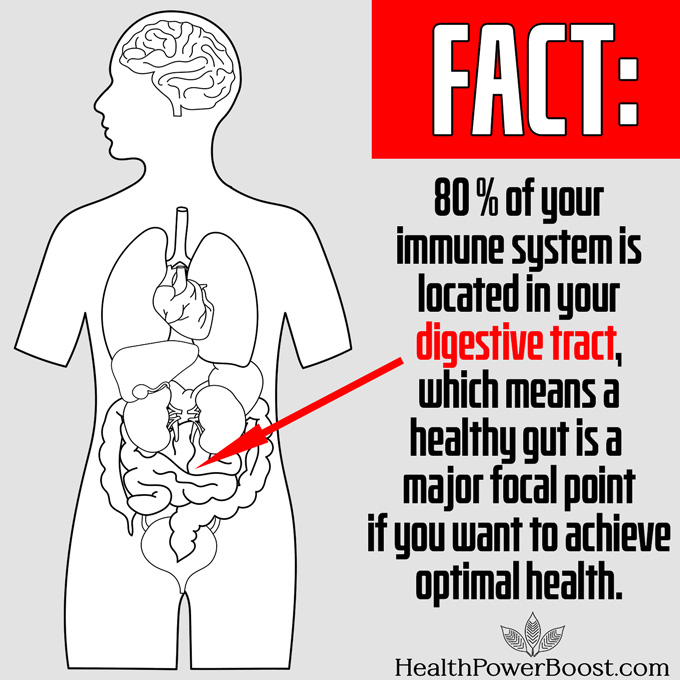This website is not medical advice. Posts may contain affiliate links from which I earn commissions at no additional cost to you.

80% Of Your Immune System Is Located In Your Digestive Tract Graphic © healthpowerboost.com. Anatomical Illustration: Pixabay (PD)
You might be surprised at the numbers in the title but they do not lie; according to a study published in 2021, about 70 to 80 percent of the body’s immune cells can be found in your intestinal tract or your “gut”. [1] With infections (specifically lower respiratory infections) ranking fourth in the WHO’s list of leading causes of deaths all over the world, [2] taking care of your immune system is a must. Your immune system is responsible for fighting against various infections and disease, and with a large percentage of it residing in your gut, taking care of your gut health can do wonders for your overall immunity!

Your Gut Health And Various Diseases
In 2015, an article was published by Johns Hopkins Medicine as part of their Advancements in Research, highlighting the relationship between gut health and immunity against certain diseases. Sears, a professor of medicine in the university, found that changes in the microbiome of the gut could contribute to the development of color cancer. Winglee, a graduate student, found a correlation between gut microbiota and pulmonary tuberculosis; TB was killing off certain species in the intestines, as if sending a signal to the body’s immune system. [3] A study by Perez-Munoz in 2014 linked changes in gut microbiota with the development of colitis, a type of bowel inflammation, though not all changes in the microbiome contributed directly to pathogenesis (the development of disease). [4]
70-80% Of Immune Cells Are In Your Gut
So what is it about the digestive tract that links it to your immunity? Wierstema, et. al. published a study in 2021 that focused on the relationship between the gut microbiome and the body’s immune system. They mentioned that over 70 to 80 percent of the body’s immune cells could be found in the gut, which could explain why changes in the gut microbiome could cause or be indicative of disease. The researchers described the body’s gut microbiota as being made up of bacteria, fungi, and viruses living synergistically with the host (the human body). You thought you were a single organism? You are also an entire ecosystem! Different factors affect this microbiome, including gender, age, nutrition, toxins, stress and environmental factors. They concluded that the gut regulates both innate and adaptive immunity by modulating the body’s mechanism for immune response, primarily through the T cells; an important type of white blood cell that fights off pathogens. [2]
In 2017, Milani, et. al. studied the gut microbiota and how the microbiota first start colonizing the digestive tract immediately after birth. Analyzing the gut microbiota of the infant digestive tract revealed links to diseases and health conditions developed later on in life such as asthma, inflammatory bowel disease and metabolic disorders. The results of this study showed how dietary adjustments should be made as early as infancy to boost your immunity and reduce your risk for disease throughout your life. [5]

Improving Your Gut Health Through Fermented Food
In various Asian countries, fermented food is a dietary staple (e.g. kimchi, yogurt, kefir). Fermented food has gained popularity over recent years because of various well-established health benefits, including that of assisting with the regulation of gut health. Dimdi, et. al. cited the probiotic effect of fermented food on gut micriobiota; kefir in particular was found to inhibit H.pylori infections in the gut and improve the gut microbiome. H. pylori is type of bacteria that causes infection in the digestive tract and can contribute to the development of ulcers in your stomach lining. [6] Stiemsma, et. al. in 2020 concluded that eating fermented food could help prevent gut dysbiosis, or a reduction in microbial diversity in the gut, which could affect the body’s immune response. [7]
Wastyk, et. al. in 2021 found that gut-microbiota targeted diets – which included fermented food and plant-based fiber – helped keep gut microbiota healthy, increasing microbial diversity and reducing inflammation. [8] In 2017, Markowiak & Slizekswa published a study on the effects of probiotics, prebiotics, and synbiotics. The study reported that probiotics were crucial for maintaining good gut health and had high therapeutic potential in managing non-communicable diseases like obesity, diabetes, and IBS (irritable bowel syndrome). [9]
Foods To Avoid
According to Bell, et. al. in 2018, a diet high in sugar, salt, and saturated fats is one of the factors that could alter your gut microbiome. [10] Bad habits and unhealthy lifestyles that include smoking and a sedentary lifestyle (no exercise!) all contribute to alterations in your gut, contributing to obesity, depression, and even mental health problems. The researchers also mentioned how fermented food like yogurt, pickles, and kefir were significant in maintaining balance in your gut microbiome, improving barrier function and permeability in the digestive tract.
Newer Studies: Gut Health Linked To Cancer
Research over the past few years have also zeroed in on gut health and cancer. With the gut microbiome linking directly to the body’s immune system, researchers have wondered what this means for (often terminal) diseases like cancer. In 2018, Meng, et. al. found that microbial dysbiosis (or an imbalance in the gut microbiota) greatly affected immunity and inflammation associated with carcinogenesis. [11] In fact, Gao, et. al. in 2017 concluded that analysis of the gut microbiome could be useful in early screening for colorectal cancer – with the gut microbiome being able to differentiate between adenomas (benign tumors) from carcinomas (cancerous tumors). [12] These results mean that monitoring your gut health could play a big role in cancer prevention and recovery. Klement and Pazienza in 2019 even suggest “cancer-specific” diets that focus on microbiota composition to help with the management of cancer. Changes in our dietary patterns would not just improve overall health but could potentially prevent cancer as well. [13]

With our gut health playing a big role in keeping ourselves safe from disease, we have to closely monitor what we include (and exclude!) from our diet. Research has shown how fermented food can help boost our gut health and prevent disease. Adding fermented food to a meal or having it as a snack can be great way to boost our gut health and overall immune response.
References:
[1] Wierstema, S., et. al. (2021). The Interplay between the Gut Microbiome and the Immune System in the Context of Infectious Diseases throughout Life and the Role of Nutrition in Optimizing Treatment Strategies. https://www.ncbi.nlm.nih.gov/pmc/articles/PMC8001875/
[2] World Health Organization. The top 10 causes of death. https://www.who.int/news-room/fact-sheets/detail/the-top-10-causes-of-death
[3] Fields, H. (2015). The Gut: Where Bacteria and Immune System Meet. https://www.hopkinsmedicine.org/research/advancements-in-research/fundamentals/in-depth/the-gut-where-bacteria-and-immune-system-meet
[4] Perez-Munoz, M., et. al. (2014). Discordance between changes in the gut microbiota and pathogenicity in a mouse model of spontaneous colitis. https://pubmed.ncbi.nlm.nih.gov/24662098/
[5] Milani, C., et. al. (2017). The First Microbial Colonizers of the Human Gut: Composition, Activities, and Health Implications of the Infant Gut Microbiota. https://pubmed.ncbi.nlm.nih.gov/29118049/
[6] Dimidi, E., et. al. (2019). Fermented Foods: Definitions and Characteristics, Impact on the Gut Microbiota and Effects on Gastrointestinal Health and Disease. https://pubmed.ncbi.nlm.nih.gov/31387262/
[7] Stiemsma, L., et. al. (2020). Does Consumption of Fermented Foods Modify the Human Gut Microbiota? https://www.ncbi.nlm.nih.gov/pmc/articles/PMC7330458/
[8] Wastyk, H., et. al. (2021). Gut-microbiota-targeted diets modulate human immune status. https://pubmed.ncbi.nlm.nih.gov/34256014/
[9] Markowiak, .P. & Slizewska, K. (2017). Effects of Probiotics, Prebiotics, and Synbiotics on Human Health. https://www.ncbi.nlm.nih.gov/pmc/articles/PMC5622781/
[10] Bell, V., et. al. (2018). One Health, Fermented Foods, and Gut Microbiota. https://pubmed.ncbi.nlm.nih.gov/30513869/
[11] Meng, C., et. al. (2018). Human Gut Microbiota and Gastrointestinal Cancer. https://www.ncbi.nlm.nih.gov/pmc/articles/PMC6000254/
[12] Gao, R., et. al. (2017). Gut microbiota and colorectal cancer. https://www.ncbi.nlm.nih.gov/pmc/articles/PMC5395603/
[13] Klement, R. & Pazienza, V. (2019). Impact of Different Types of Diet on Gut Microbiota Profiles and Cancer Prevention and Treatment. https://www.ncbi.nlm.nih.gov/pmc/articles/PMC6524347/
😳 What Tinnitus Does To Your Brain Cells (And How To Stop It)
After 47 years of studies and countless brain scans done on more than 2,400 tinnitus patients, scientists at the MIT Institute found that in a shocking 96% of cases, tinnitus was actually shrinking their brain cells.
As it turns out, tinnitus and brain health are strongly linked.
Even more interesting: The reason why top army officials are not deaf after decades of hearing machine guns, bombs going off and helicopter noises…
Is because they are using something called "the wire method", a simple protocol inspired by a classified surgery on deaf people from the 1950s...
★ Does Your Salad Contain This Vegetable?
★ Try This 100% Natural Essential Oil Mix For Nail Fungus:
★ I Can't Help Showing This Off:
If you haven't heard of Claude Davis yet do yourself a huge favor and watch this video.
One of the smartest guys I ever had the pleasure of meeting, Claude set-up a unique prepping system that changed his life forever.
I already tried it myself and let me tell... you I was completely blown away... His surprising tactics could make your life easier and give you the peace of mind you deserve.
Don't just take my word for it... watch his short video and decide for yourself.








